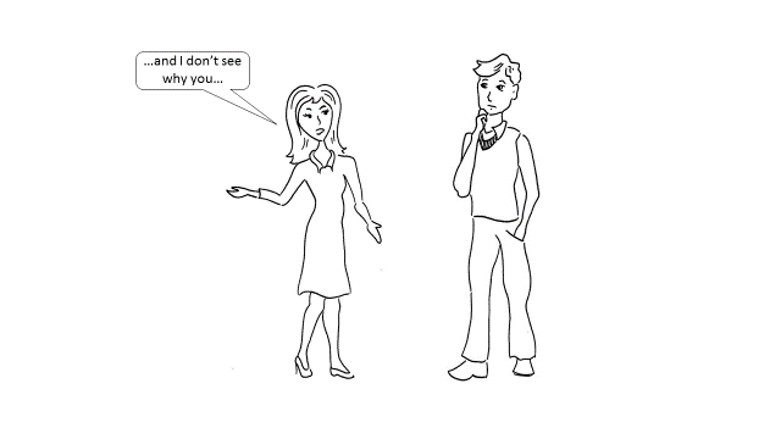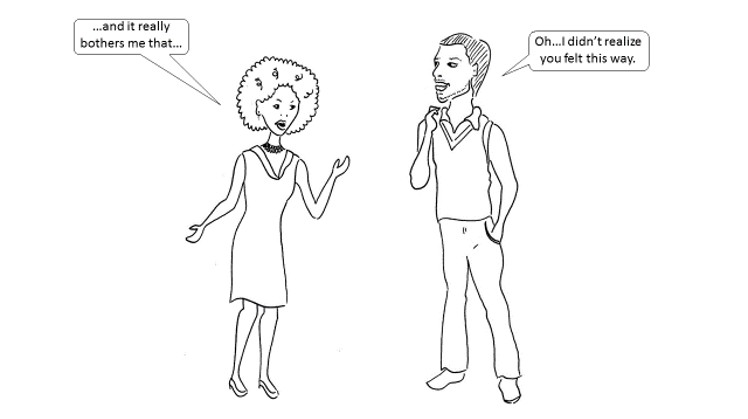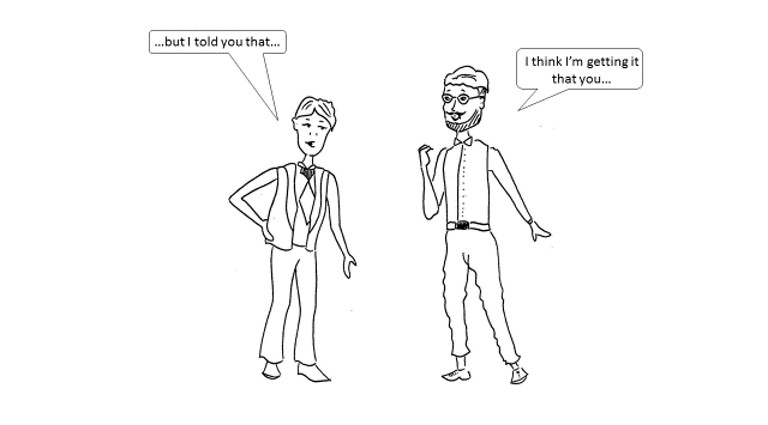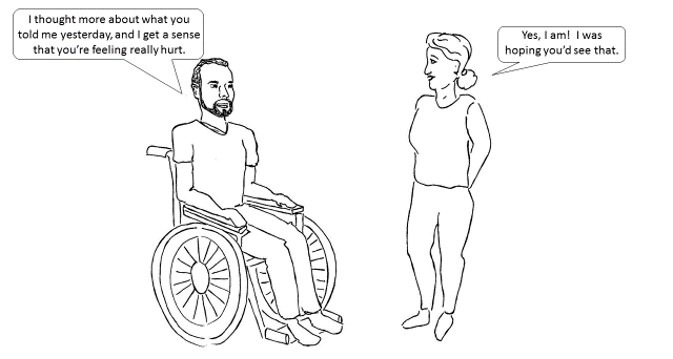
Communication Skills for Restoring and Maintaining Togetherness
© 2019, Robin Ticic, BA, HP Psychotherapy, and Bruce Ecker, MA, LMFT
Adapted from the Couple Rescue Skill Builder Handbook with permission from the Coherence Psychology
Institute, LLC.
So often in couple relationships, both partners find themselves yearning for the satisfying togetherness they
once enjoyed. The couple’s initial mutual delight has become eclipsed by problematic patterns of interacting
that feed a growing dissatisfaction.
A very common cause of couples getting stuck in dissatisfaction is differing needs and expectations of
each other in the area of emotional closeness. Is that your dilemma? Maybe one of you yearns for a type of
connection that is not forthcoming…and the other one may be at a loss to understand what’s missing; or
one of you is making every effort as well as he or she knows how to do, and feels that it’s just not being seen
or acknowledged by the other one. Life experiences with closeness and emotional intimacy vary dramatically,
starting from our very beginnings. And while there is no “right” or “wrong” about how to be close to another
person, there are indeed some fundamental skills that can help partners become more closely aligned in
giving and receiving and encouraging emotional intimacy.
This article is for those partners who are less accustomed to emotional closeness. A relationship’s difficulties
arise, as a rule, not from one partner being solely responsible, but rather from the contributions of both
partners. Nonetheless, we have observed over many years of professional and personal experience that
partners who initially feel uncomfortable with emotional intimacy can use the simple skills described in this
article to discover the importance and the value of the emotional side of relationship. And those who are
already at home with emotional closeness can further hone their skills.
As you become familiar with these specific skills, you may well find ways to work on this not just on your
own, but together, in partnership. A whole cascade of welcome ripple effects could develop and
enhance satisfaction in your couple relationship. Ideally, both partners will work on developing
these skills.

Honing simple but often neglected communication and listening skills can rescue an increasingly
troubled couple relationship. For a relationship to end due to the absence of these basic skills is
like drowning in ankle-deep water – so easily avoidable by the right moves. They are not hard to
make if you know what they are. And we predict you will be pleasantly surprised by what you’ll
find in the rewarding world of emotional communication.
Recognizing Distress Signals
Does any of the following sound or feel familiar? Have you heard these things from your
partner or said them to your partner? These are the types of distress signals typically voiced by
a partner who wants more emotional intimacy and connection:
Greetings
The Wise Brain Bulletin offers skillful means from brain science and contemplative practice – to nurture your brain for the benefit of yourself and everyone you touch.
The Bulletin is offered freely, and you are welcome to share it with others. Past issues are posted at http://www.wisebrain.org/tools/wise-brain-bulletin.
Rick Hanson, PhD, edits the Bulletin. Michelle Keane is its managing editor, and it’s designed and laid out by the design team at Content Strategy Online.
To subscribe, go to http://www.wisebrain.org/tools/wise-brain-bulletin.
- You’re not listening to me. I’m talking about my feelings. You don’t even seem to notice my
feelings. - You never talk about your own feelings, either, and that leaves me feeling disconnected and
totally in the dark about what’s really going on inside you. It feels as if you’re dealing with
your own stuff alone or even ignoring your own issues
entirely. - When we disagree, you don’t know how to communicate or discuss things constructively.
- In sex, you don’t get my cues about what works for me
and what doesn’t. - You don’t seem to understand that before I can have
any desire for sexual intimacy with you, I need to feel
we’re in good emotional connection. For me, our whole
relationship is foreplay. But you seem to need the physical
part first in order to get to the emotional part. So we’re
in a continual catch-22 about that. - You make decisions about things that affect both of us
without involving me in the decision-making process. - You aren’t involved enough in everyday family life; it
doesn’t feel like teamwork. We’re together but separate;
and I feel alone in all of this. - You think you know all the answers—and you give them,
even when I’m not asking for answers or advice.
The partner who is on the receiving end of those complaints—and who may be less
accustomed to emotional intimacy and connection—is usually baffled by them and might reply
in some of the following ways. Do any of these sound or feel familiar?
- I feel responsible for making you happy, but I have no idea how to do that. I don’t see how
I’ll ever understand you. - I don’t feel appreciated; I’m never good enough. All you do is criticize me—even though I’m
trying so hard. You don’t seem to value all that I’m already doing, fixing, and providing. - You drag out old disagreements that we’ve gone over and over and over. I’ve explained and
apologized, but you won’t let me forget about it. - You’re not willing to have sex often enough, and you don’t get how urgently I want and
need it—not just physically but also to feel connected and desired. - You’re not romantic with me anymore. I’m confused and disappointed.
- Things have gotten serious and problematic. It’s not as much fun as before, and I don’t
understand what’s gone wrong and why you’re so dissatisfied. - I feel togetherness just from both of us being home, but that’s not good enough for you.
- The kids and your parents and even the pets are more important to you than I am.
- You blame me for not making time to talk, but how can we possibly have a conversation
when the kids are constantly needing attention…or work demands are relentless…or it’s
late at night when I’m exhausted and can’t possibly give you my full attention?
Understanding how emotional connection and emotional communication work is knowledge
that can readily be used to create enriching, mid-course adjustments in your couple relationship.
When you are ready to begin trying out and acquiring the skills described in this article, we
suggest focusing on one skill at a time, digesting it thoroughly and moving on to other skills at
your own pace.
Every step you take is a step in the right direction. New skills tend to feel stilted at first, but they
become natural with ongoing use. What’s most important is that you’re making that effort. And this is not about changing who you are; it’s about developing additional skills.

As your familiarity with these skills develops, you will begin to see and appreciate the deep
emotional logic inherent in how people act, feel, and think. Does “emotional logic” sound like a
contradiction in terms? You’ll see that it is not a contradiction at all.

Our emotional system is coherent—meaning that it has an underlying intelligence and logic.
As you begin to see into that logic, your partner’s emotions and behavior will cease to be a
mystery—and so will your own!
A note about pronouns
The partner who wants greater emotional closeness could be a “she,” a “he,” or a person who
identifies in some other way. We’ve attempted to keep our writing gender-neutral by using
composite pronouns like “s/he” and “him/her” to refer to the reader’s partner. We intend that
to refer to the entire spectrum of gender possibilities. At the same time, our experience with
couples tells us that very often “she” is the partner seeking greater emotional intimacy and “he”
is the partner who is less familiar with that way of relating. So, we use pronouns reflecting that
common constellation in the couple example that threads through the handbook. We ask that
you, dear reader, mentally adjust the pronouns to fit your situation, because this handbook is
intended for use by all people and in all types of couple relationships.
SKILL 1. LISTEN

What that means: This most fundamental ingredient for couple closeness consists of giving
devoted attention—to the best of your ability—when your partner is telling you about
important personal things, without distractions or multitasking, like glancing at your phone or a
magazine while your partner is talking.
Why it’s important: For your partner to feel your full, caring attention and caring
understanding as you listen to him/her is the core of emotional connection. It’s what
communicates, “You truly matter to me.” Of course, this should be a two-way process. Each of
you has this basic need for attention and understanding from your partner, though perhaps to
different degrees or in different ways. It’s a universal, fundamental human need to be seen and
heard.
Quality personal attention is the bond—the heart and soul of connection. The feeling of
closeness and connection is a major source of security, trust, warmth, joy, enrichment, and
intimacy in a relationship.
How to do it: Make eye contact and listen with your full attention, with the active intention
of just hearing and taking in what your partner is saying and what it means to him/her, without
necessarily being able to make full sense of it yet. At this stage, listening silently is fine.
In the box below is an example illustrating this skill—and the couple depicted will thread through all of the other skills as well. Here we’re seeing this couple as they dive into a tense but not unusual interaction between partners.
It’s Saturday morning, Alex is at the breakfast table reading his newspaper, and his partner Chris
announces to him, “There’s something I have to say. You’re just not pulling your weight with the
kids and the household, and I’m pretty upset about it.”
In response, Alex looks right at Chris so she knows that he’s connecting with her and willing to
hear about something that’s clearly important to her, even though it’s uncomfortable for him.
What might need extra attention: In the example just above, you might sense immediately
how tempting or automatic it can feel to react in some way other than simply listening. You
may not feel able to listen in this way for one reason or another—as, for instance, when you’re
feeling defensive, or discouraged, or just plain overtired. That happens sometimes, of course, and
we will guide you in skills 10 and 12 below in working through that situation when it occurs.
Let’s assume for the moment, though, that you are able to listen attentively.
SKILL 2. LISTEN AND ACKNOWLEDGE

What that means: This is about letting your partner know that you are actually “letting in” and
registering what s/he is telling you.
Why it’s important: In order to feel connected with you, your partner needs to know you’re
taking in and considering what s/he’s saying, not just hearing the sound of his/her voice and not
just waiting for the interaction to end.
How to do it: Periodically offer simple verbal and nonverbal acknowledgments in whatever way
comes naturally to you as an expression of actively paying attention, such as saying “I see” or nodding
while making eye contact.
As Chris begins to offer more detail about all that’s resting on her shoulders, Alex begins to
acknowledge what Chris is telling him by saying, “Oh…I see…I didn’t realize you felt this way.”
What might need extra attention: As you’re fully letting in your partner’s message, it’s likely you’ll
begin having your own reactions. That’s normal and natural, of course. What’s important here is to
realize consciously that you are having your own reactions—which, at times, may even feel intense—
and to ask yourself whether you’re able to hold your reactions for later and first dedicate yourself,
for the moment at least, to making sure s/he feels heard. Again, we’re assuming for now that you are,
indeed, able to listen to and acknowledge what you’re hearing from your partner. If not, skills 10 and
12 below will guide you further.
SKILL 3. LISTEN AND REFLECT BACK

What that means: Simply check in with your partner as to whether you’re understanding him/her
accurately, by briefly but explicitly reviewing what you’ve heard. You’re creating a feedback loop. If
your understanding is off—and that can certainly happen—s/he then has the opportunity to explain
in a different way.
Why it’s important: S/he needs to know you’re engaged in understanding what you’re hearing. If
you’re just sitting there and silently “getting it,” s/he won’t necessarily feel heard. Listening silently for too long can come across as non-involvement in what s/he’s telling you.
Particularly in long-term relationships it’s important to avoid assuming that you already know and
understand what your partner is communicating. The only way to be sure is to create this feedback
loop.
How to do it: Briefly repeat key aspects of your partner’s message in your own words. Take care to
stay very close to what you’re hearing and seeing from him/her, leaving your own interpretations,
elaborations, and assumptions by the wayside as much as you can, knowing you’ll get to voice your
own response before long.
Statements will generally work better than questions in your quest for better understanding of your
partner. Questions have a way of making people feel they need to come up with good answers—
which they often don’t have. Try saying things like “What I think I’m understanding from you is…” or
“It sounds as if you mean…” or “I’d love to understand more about….” Formulations of that sort
contain the implicit question “Am I getting it right?” which invites—but doesn’t demand—further
clarification from him/her.
Making the effort to understand is the lion’s share of showing your partner that you truly care about
him/her and therefore are genuinely interested in what s/he’s saying to you.
Chris tells Alex, “I feel left alone with the responsibilities of caring for the children and running the
household… and it feels as though you’re not really together with me in it.”
Alex responds, “What I’m getting is that for you it’s not only about sharing the effort fairly, it’s also
very much about feeling we’re really together in it, which you haven’t been feeling. I didn’t realize
that before.”
What might need extra attention: Right at this juncture, many partners will be very tempted to
defend themselves, or to explain why the partner’s feelings are “wrong.” See if you can dedicate
yourself, though, to just listening and really understanding what you’re hearing about what your
partner is experiencing. Remember that understanding your partner does not mean you are
agreeing with him/her or feeling the same way yourself. This can be very challenging at first. Most
people find that it takes concerted practice, so be patient with yourself.
SKILL 4. EMPATHIZE

What that means: To empathize is to put yourself in the other person’s shoes…to pay attention
to what the other person is experiencing and, to some degree, have a vicarious sense of what your
partner seems to be feeling. To communicate your empathy is to make it apparent to the person that
you are really tuning in to what s/he is experiencing and feeling, and how s/he is understanding things.
Whereas an understanding of the content of your partner’s communication—the actual words—is
largely an intellectual endeavor, empathizing with how s/he feels forges an emotional connection in
which you’re getting a “felt sense” of his/her subjective experience. Ideally, you’re operating on both
of those tracks. You need to understand the content well enough to be able to empathize accurately
with your partner’s experience of that content. So you focus on content at certain moments and
then bring your focus back to his/her subjective experience. With practice, this alternation in focus
becomes a natural ebb and flow.
Why it’s important: Your partner needs to know you can relate to how s/he feels—or at least that
you’re making your best attempt to do so. Seeing that it matters to you to understand your partner’s
experience is often all s/he really wants and needs in order to feel emotionally connected to you. Yes, it’s
that simple! You don’t have to figure out how to solve your partner’s problem. In fact, solving his/
her problem won’t engender emotional connection (and we’ll talk more about this later on), but
empathizing will.
Maybe at times you find yourself regarding emotions as something problematic and messy—
something better to avoid. For sure, the extreme emotionalism of some people can be difficult
and unpleasant. That isn’t representative of emotion in people’s lives, however, and emotions are
not inherently problematic. In fact, they are crucial for directly experiencing connection and life in its
richness. A person’s emotions exist—they’re right there—and any attempts to ignore them or play
them down will very likely backfire.
How to do it: As you respond and reflect back, also tell your partner what you understand s/he’s feeling
and experiencing—and why these things matter to him/her—right alongside the factual content that you’re
acknowledging.
Chris says, “It just doesn’t feel as though we’re actually together in life. We started this family together, but
it feels more and more as though we’re just living our separate lives in parallel… kind of together in name
only.”
Hearing that, Alex pays attention to the feelings Chris seems to be having. He even lets her know what’s
coming across to him that she might not be saying out loud by saying, “I’m getting the idea that you’re
feeling not only overworked, but actually almost abandoned… as if we went into all of this together but
now you’re having to fend for yourself. Is that how it’s feeling to you?”
What might need extra attention: Listening, understanding, and empathizing can initially feel like a big
job. When you see your partner’s happiness in feeling more connected with you, though—and his/her
resulting satisfaction with you—you’ll feel the effort it requires of you is well worth making. Be aware, too,
that s/he’ll need to see that you are fairly consistent and reliable in maintaining genuine emotional contact
before s/he can really count on it to be a regular part of life together, as s/he needs it to be. Trust grows
from consistency over time, so that means you need to keep at it! Don’t be discouraged if it takes time to
cultivate your partner’s trust in your newly emerging capacity for emotional communication.
That night, as Alex is trying to be physically intimate with Chris, she reveals more about how she feels—
feelings that have been stored up for a long time. She says, “Oh—so now you want to come around and
‘visit’ me for the fun stuff! How can you expect me to be close this way all of a sudden, when I don’t feel
closeness coming from you in all the other ways that matter to me? It just doesn’t work that way for me!”
You may want to argue with your partner or prove him/her wrong—very understandably. And it can be
extremely challenging for you to empathize if you’re feeling criticized or unappreciated! You’ll discover,
though, as you become more skilled at listening deeply, that it is futile to argue against someone’s feelings.
They are what they are. However, feelings can change as a result of new experiences.
For some people, being sexual may be the very way to feel close. If that’s how you feel, you may be puzzled
if it’s not that way for your partner. For other people, a major factor governing the inclination to be sexual
is the emotional closeness that comes from feeling emotionally understood by their partner. In that case, emotional understanding and empathy are crucial ingredients in opening the door to sexuality.
If your partner’s heart, mind and body follow different patterns from yours, that doesn’t mean that his/
hers are wrong or in need of correction—just as your patterns of heart, mind and body are valid for
you. Your desires for having satisfying sex are not wrong, and neither are the conditions that enable
your partner to be receptive to being sexual. It’s a matter of two people’s needs being understood and
responded to respectfully.
What works best as a first step, therefore, is simply to pay attention and express recognition and acceptance
of your partner’s pattern just as it is, even though that pattern may be a dilemma for you. And remember
that your patterns may be a dilemma for your partner, as well.
In sex it is particularly important to hear with empathy and remember your partner’s indications of what
s/he enjoys and doesn’t enjoy. Few missteps in couple relationship are as alienating as not heeding or even
remembering your partner’s indications of what doesn’t feel okay sexually, and then engaging in those
unwelcome behaviors yet again. Why? Because when you again do what you’ve already been told causes
suffering, to your partner that registers emotionally as meaning that you don’t truly care about him/her,
and that your own pleasure matters more to you than sparing your partner from strong discomfort or
even distress. To love someone means that that person’s well-being is as important to you as your own
well-being. To love someone means you remember what gives him/her delight and what brings suffering.
Listening with empathy is how you hear those messages loud and clear.
You can’t read your partner’s mind—about sex or anything else—but you can notice and remember what
s/he does mention about what s/he enjoys, wants, needs, finds interesting, or is curious about—whether
it’s some useful item, a book, a movie, a type of food, a new experience, or anything else. Your caring
thoughtfulness in hearing, remembering and actively responding—without your partner asking you to do
so—is one of the most powerful and beautiful ways of communicating your love and making your partner
feel loved, far more deeply, in fact, than great sex can ever do.

ABOUT THE AUTHOR
 Robin Ticic, BA, HP Psychotherapy (Germany), director of
Robin Ticic, BA, HP Psychotherapy (Germany), director of
development and training of the Coherence Psychology Institute,
is in private practice near Cologne, Germany, specializing in trauma
therapy, and for many years served as a psychologist for the
Psychotraumatology Institute of the University of Cologne. She is a
certified trainer of Coherence Therapy and conducts clinical workshops
internationally. She is co-author of Unlocking the Emotional Brain: Eliminating Symptoms at Their Roots Using Memory Reconsolidation and author of How to Connect with Your Child. She has extensive experience in communications counseling, courses and presentations, and has been honored for her community work with parents.#
 Bruce Ecker, MA, LMFT, is co-director of the Coherence Psychology
Bruce Ecker, MA, LMFT, is co-director of the Coherence Psychology
Institute, co-originator of Coherence Therapy, and co-author of Unlocking the Emotional Brain: Eliminating Symptoms at Their Roots Using Memory Reconsolidation; the Coherence Therapy Practice Manual & Training Guide; and Depth Oriented Brief Therapy: How To Be Brief When You Were Trained To Be Deep and Vice Versa. Clarifying how transformational change takes
place is the central theme of Bruce Ecker’s clinical career, and he has contributed many innovations in concepts and methods of experiential psychotherapy. Since 2006 he has driven the clinical field’s recognition of memory reconsolidation as the core process of transformational change and has developed the application of this brain research breakthrough to advancements in therapeutic effectiveness. Bruce is a frequent presenter at conferences and workshops internationally, has taught extensively in clinical graduate programs, and has a private practice.
Leonie Schwettmann, BA, Fine Arts, is a recipient of the 2016 prize from the Leibniz-Zentrum fuer Lebenslanges Lernen for promising young artists, as well as the 2018 Deutschland stipendium in art and
architecture.
Posted by mkeane on Wednesday, February 19th, 2020 @ 10:52PM
Categories:
